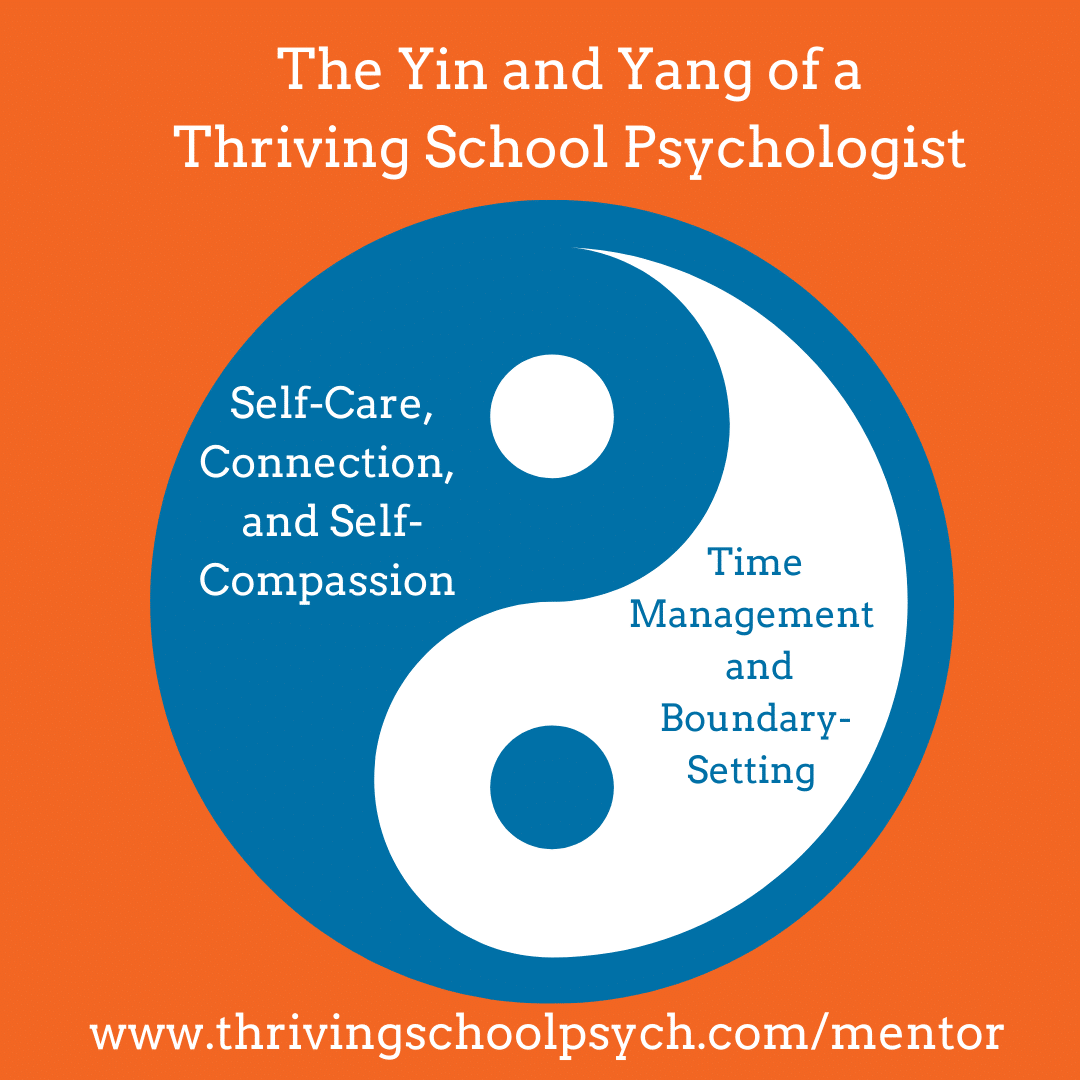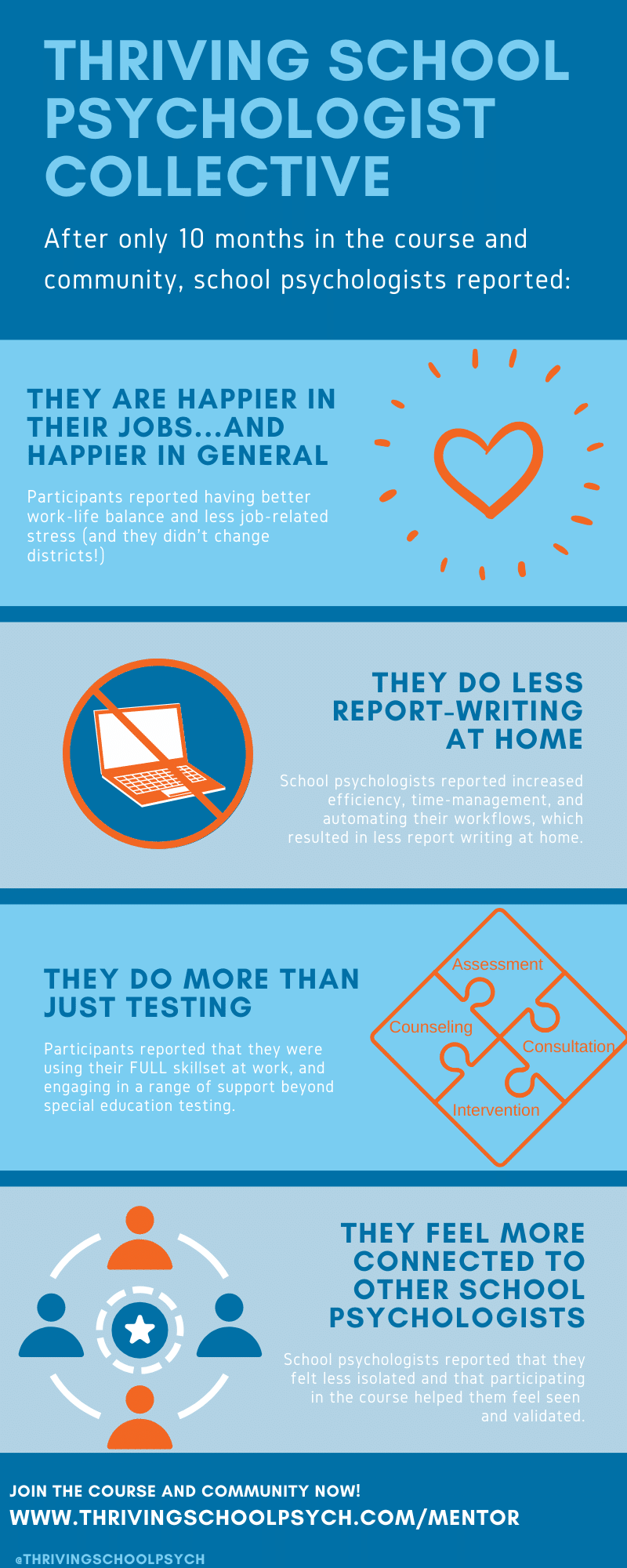I was recently visiting the library, checking out my favorite section as of late – the section of psychology books that talk about the intersection of productivity and self-care. Self-care is so important, especially at this time of the year when we have the usual deadlines combined with the extra commitments of the holiday season.
Self-care is also on my mind because I just attended a presentation from Kristen Neff – if you don’t know her work, you should absolutely check her out. She talks about self-compassion, and the “yin and yang of self-compassion,” and it got me thinking that there’s also a yin and yang to thriving as a school psychologist.

Here is an awkward photo in horrible lighting of me and Kristin Neff to prove I went to her talk.
The yin energy is around self-care – setting boundaries, being compassionate, and doing the best with the tools you have, as well as giving yourself grace when your best doesn’t feel good enough. We all have likely had the experience of doing the most you can for a student, bringing home unfinished work, and then….you’re under near-constant stress because work is never done. Then, you may feel like you should activate your self-care, but you don’t always do it on a regular basis. Learning tools to be consistent in your own self care is a big part of creating the necessary balance of yin energy in your life.
On the complementary side is the yang energy of balancing caring for others with healthy boundaries: Learning how to advocate for students, how to unshackle yourself from your laptop, and set healthy work boundaries so that you can be there for your students. Balancing that yang energy is also vital and includes utilizing tools around productivity and time management hacks.

It’s been really fascinating that, over the past couple of years in the Thriving School Psychologist collective cohorts, participants have told me that the course has helped them with both of these areas.
In a pre-course survey, the majority of the participants responded that they were taking the course because they were burned out and struggling to regain their passion for their job. They had too much to do and not enough time or support, and I can’t tell you the number of times I saw the phrase “I don’t want to be just a testing machine.”
This is where learning the yin of self-care and making sure that you’re rested and refreshed comes in, because rested, happy minds are more productive.
The other top reason participants chose to take the course was to learn strategies for streamlining their workflow, becoming more efficient and finding productivity hacks for report writing in order to free up time to be with students.
Learning the yang of time management and boundary-setting around your time is a huge piece of being an effective school psychologist and creating that equal complement to the yin side.
Of course you don’t have to be totally burnt out to enjoy the benefits of the Thriving School Psychologist collective! You may just have a love of learning and you want to learn more: how to be a better school psychologist, how to learn from your colleagues, and how to connect with others.
The good news is that as far as creating that yin and yang balance in your life, I’ve done the work for you! Basically if there’s a book on self-care and productivity, I have absolutely read it, and I have learned from other participants in the course about the things that work as a school psychologist.
Being a school psychologist often means that because we love and care for our students so much, we can sometimes put our own self-care on the back burner–but it doesn’t have to be that way.
All that is to say that it’s now DECISION TIME about whether or not you want to enroll in the latest cohort of the Thriving School Psychologist Collective, and I wanted to give you a couple things to consider.
Other feedback I’ve received from the participants in the cohorts is that the course has moved the needle for them in a few key areas, and I want to share those with you:
- They do less report writing at home – which is a big win – because it frees up their time to be with friends and family.
- At the same time, they’re able to expand their roles at work; doing more than just testing and writing reports and going to IEP meetings and repeating the “diagnose-and-adios” model of school psychology.
- They have told me is that they’re happier in their jobs AND in general in their lives. It makes sense, because when you have better work-life balance, you’re happier and you’re a better school psychologist.
- The course has really helped them feel a sense of community. They feel more connected and seen, because they’re able to collaborate with other school psychologists across the country who experience the same things that they do. And other school psychs who have maybe worked out solutions that their colleagues can apply to their own situations.

Want to read personal stories of transformation from school psychologists just like you before you decide if you’re ready to invest in your self-care and career satisfaction?
Feel free to check out the testimonials from school psychs just like you…Go to thrivingschoolpsych.com/mentor and check out the testimonials at the bottom of the page, and you can see how the Thriving School Psych collective can truly help you balance both the yin and yang of your job.
I look forward to seeing you there! Enrollment closes soon, so don’t miss your chance to be a part of this wonderful collective of empowered school psychologists! Course enrollment ends this Sunday, December 8th, 2019 at midnight, so sign up now—there’s a few surprise bonuses in store for you as well when you sign up–check them out here!
I would like to sign up and attend!
Hi Michelle! If you’re interested in the TSP Collective, you can check out the link at http://www.thrivingschoolpsych.com/mentor. 🙂